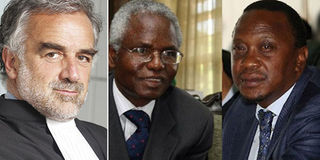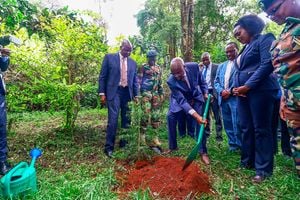Uhuru organised Kenya chaos, ICC judges told

Photos/FILE
The ICC chief prosecutor Luis Moreno-Ocampo (left), Public Service head Francis Muthaura (centre) and Finance minister Uhuru Kenyatta.
THE HAGUE — Kenya's Deputy Prime Minister Uhuru Kenyatta organised deadly attacks on the opposition after disputed 2007 polls to keep the ruling party's power by "any means necessary", the world war crimes court heard Thursday. (Follow live updates here: Nation.co.ke/ICCLive)
Kenyatta, 49, Kenyan President Mwai Kibaki's right-hand man Francis Muthaura, 64, and ex-police chief Mohammed Hussein Ali, 55, are facing judges to confirm if they should stand trial for the 2007-08 unrest following the controversial polls, the worst bloodshed since independence in 1963.
"The evidence will show... that Mr Kenyatta and Mr Muthaura created a common plan and policy to retaliate and keep the PNU in power through any means necessary," prosecutor Adesola Adeboyejo told the International Criminal Court.
"These attacks were not spontaneous. Mr Muthaura and Kenyatta organised and directed forces which then unleashed the attacks," she said.
The three each face five counts of crimes against humanity and remain free.
The hearings, during which prosecutors will try to convince the court they have enough evidence to go to trial, are scheduled to run until October 5.
And lawyers for the three, who told the court at Wednesday's opening there was no evidence linking their clients to the violence, will next week argue their cases.
The men are suspected of devising and implementing a plan to attack supporters of then opponent and now Prime Minister Raila Odinga's Orange Democratic Movement after polls, which the ODM claimed were rigged.
Reprisals
The ICC prosecutor's office said 1,133 people died and more than 663,000 others were displaced after clashes between the rival supporters, when political-motivated riots turned to ethnic killings, sparking further reprisals in the Rift Valley.
Kenyatta, Adeboyejo said quoting witnesses, had long-running ties with the country's main criminal group, the Mungiki, and he and Muthaura forged it and police into a network to carry out the attacks.
"Kenyatta had close ties with the Mungiki -- ties that go back many years," Adeboyejo said. "Muthaura had de facto powers over the Kenya police," she said. "Evidence will show that Mr Muthaura and Kenyatta used this ad hoc organisation to carry out their plans."
The Mungiki are described as a mafia-like group inspired by the Mau-Mau who fought for Kenyan independence and which combines a mystical blend of Christian doctrines with traditional African practices.
The organisation, whose strongholds are in Nairobi and in areas of the dominant ethnic group in Kenya, the Kikuyu, has gradually turned to racketeering and is widely known for beheading some of its victims.
The three are the second group of senior Kenyans to appear before the court after ICC prosecutor Luis Moreno-Ocampo in December 2010 asked judges to issue summonses against them for crimes against humanity.
Earlier this month ex-Kenyan ministers William Ruto and Henry Kosgey, as well as radio executive Joshua arap Sang, also appeared before the court to determine if they should stand trial for their part in the violence.
Supporters of Odinga's ODM, they are blamed for attacks on PNU members in the Rift Valley. They all protested their innocence and the court's decision is still awaited.
Kenya last month lost an appeal to stop the ICC from trying the six men, with the court turning down a request to have them in the dock in Nairobi.




